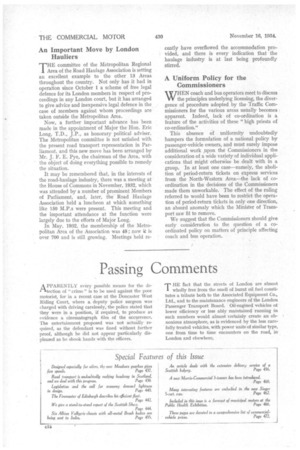An Important Move by London Hauliers
Page 84

If you've noticed an error in this article please click here to report it so we can fix it.
THE committee of the Metropolitan Regional Area of the Road Haulage Association is setting an excellent example to the other. 13 Areas throughout the country. Not only has it had in operation since October 1 a scheme of free legal defence for its London members in respect of proceedings in any London court, but it has arranged to give advice and inexpensive legal defence in the case of members against whom proceedings are taken outside the Metropolitan Area. Now, a further important advance has been made in the appointment of Major the Hon. Eric Long, T.D., J.P., as honorary political adviser. The Metropolitan committee is not satisfied with the present road transport representation in Parliament, and this new move has been arranged by Mr. J. F. E. Pye, the chairman of the Area, with the object of doing everything possible to remedy the situation.
It may be remembered that, in the interests of the road-haulage industry, there was a meeting at the House of Commons in November, 1932, which was attended by a number of prominent Members of Parliament, and, later, the Road Haulage Association held a luncheon at which something like 150 M.P.s were present. This meeting and the important attendance at the function were largely due to the efforts of Major Long. In May, 1932, the membership of the Metropolitan Area of the Association was 48; now it is over 700 and is still growing. Meetings held re cently have overflowed the accommodation provided, and there is every indication that the haulage industry is at last being profoundly stirred.
A Uniform Policy for the Commissioners
WHEN coach and bus operators meet to discuss the principles underlying licensing, the divergence of procedure adopted by the Traffic Commissioners for the various areas usually becomes apparent. Indeed, lack of co-ordination is a feature of the activities of these "high priests of co-ordination."
This absence of uniformity undoubtedly hampers the formulation of a national policy by passenger-vehicle owners, and must surely impose additional work upon the Commissioners in the consideration of a wide variety of individual applications that might otherwise be dealt with in a group. In at least one case—namely, the abolition of period-return tickets on express services from the North-Western Area—the lack of coordination in the decisions of the Commissioners made them unworkable. The effect of the ruling referred to would have been to restrict the operation of period-return tickets in only one direction, an absurd anomaly which the Minister of Transport saw fit to remove. We suggest that the Commissioners should give early consideration to the question of a coordinated policy on matters of principle affecting coach and bus operation.




















































































































































































